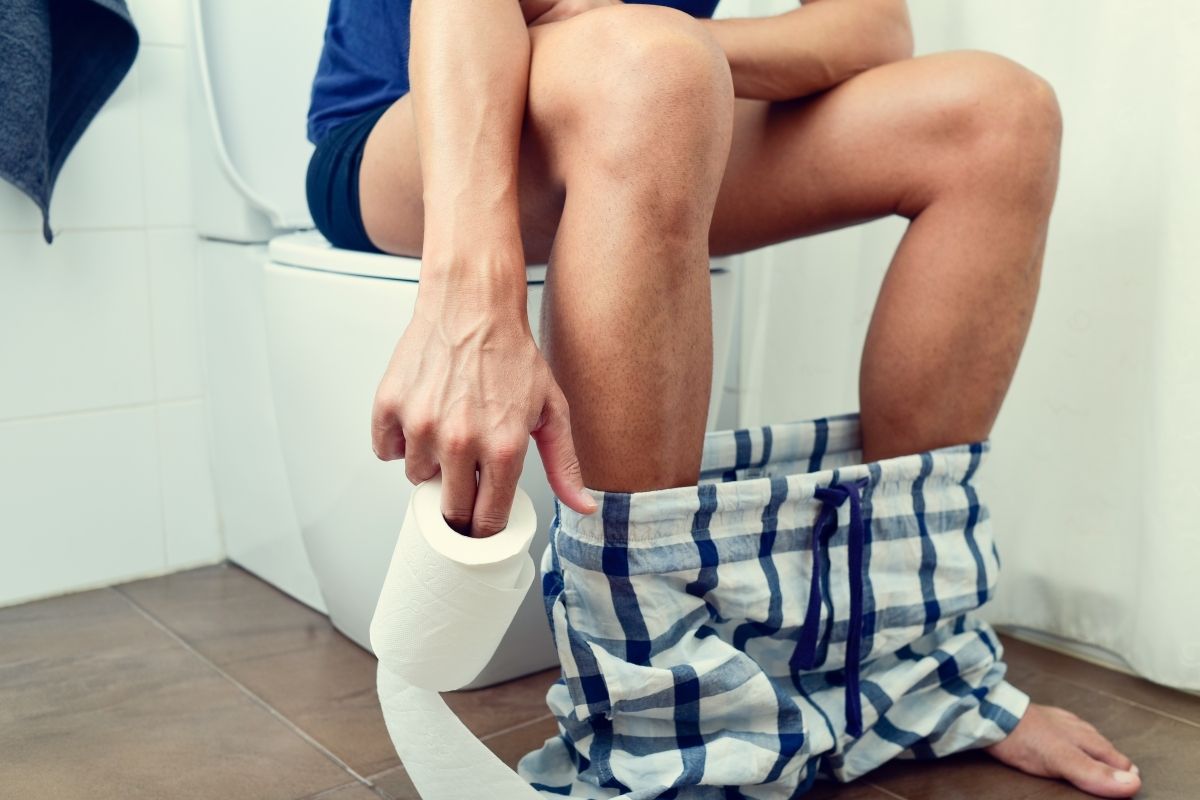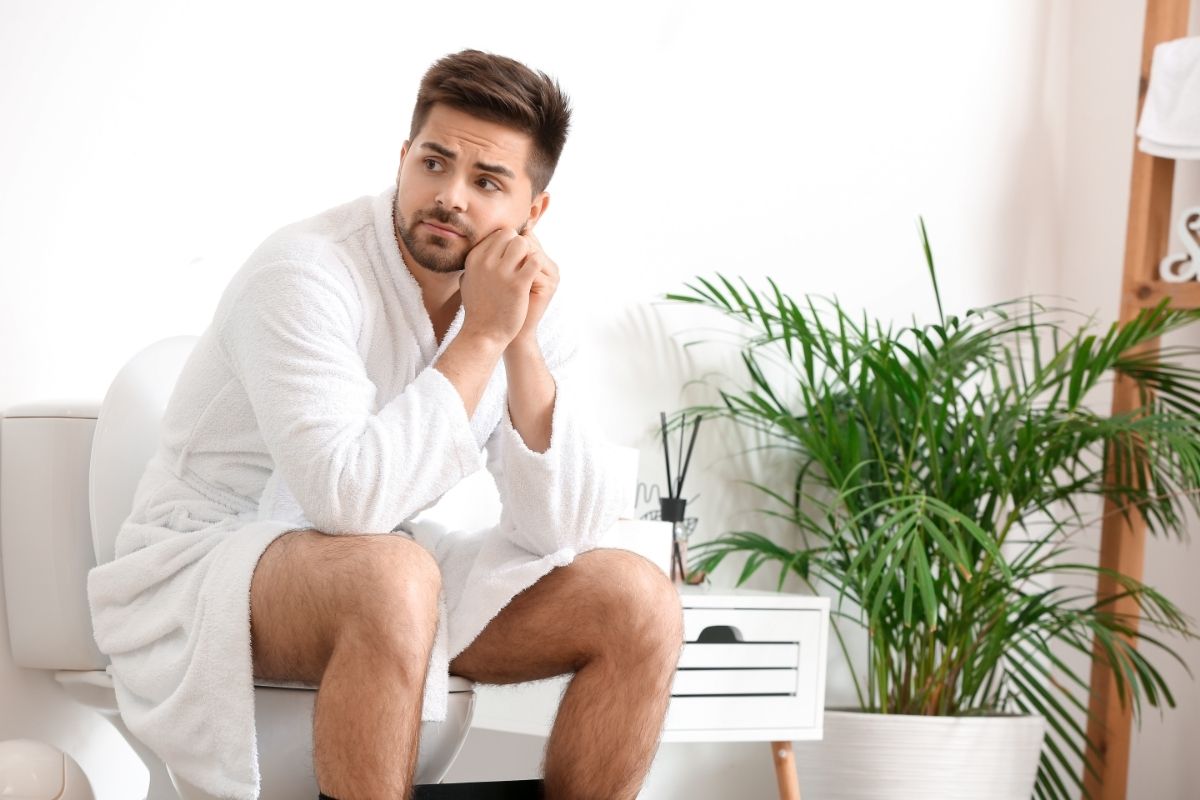Why Does Anxiety Make You Poop?

Anxiety can make you poop.
It’s like your gut is playing a twisted game of musical chairs with your emotions.
Ever felt that sudden urge to sprint to the bathroom when you’re stressed?
You’re not alone.
Anxiety and your bowels are secret pen pals, always writing to each other.
This article is your backstage pass to the wild world of anxiety poop.
You’ll learn why your tummy does the rumba when you’re nervous, and how to tame that anxious tiger in your tank.
Buckle up, buttercup!
We’re about to dive into the porcelain-deep mysteries of your nervous number twos.
By the end, you’ll be a pro at handling your anxiety-induced toilet troubles.
What’s the Scoop on Anxiety Poop?
Anxiety causes your body to go haywire, especially in the stomach department.
Anxiety poop is like your brain hitting the panic button on your digestive system.
Your noggin’s sending SOS signals to your gut, telling it to go into overdrive.
It’s like your stomach’s throwing a wild party, and everyone’s invited – including your lunch from three days ago.
This can lead to a whole buffet of tummy troubles: constipation, diarrhea, and nausea.
It’s like your digestive system’s playing Russian roulette, and you never know what you’re gonna get.
Why Does Your Tummy Tango When You’re Anxious?
Ever heard of the gut-brain axis?
It’s like a secret hotline between your noodle and your noodles, if you catch my drift.
When your brain hits the panic button, it releases stress hormones faster than a cat on a hot tin roof.
Your body responds by throwing a fit – and sometimes, that fit happens in the bathroom.
Here’s the kicker: serotonin, that happy little hormone, plays double agent.
It’s not just about making you feel good; it’s also the ringleader of your gut circus.
When serotonin’s in the house, your colon starts doing the conga.
And let’s not forget the vagus nerve – it’s like the gossipy neighbor of your body, always passing messages around.
When it’s on the fritz, your gut goes bonkers.
Putting a Cork in Anxiety Poop
Fixing anxiety poop is like trying to nail jelly to a wall – tricky, but not impossible.
The real MVP move?
Tackle that anxiety head-on.
Chatting with a shrink can be a game-changer.
It’s like having a personal trainer for your brain.
But if you’re more of a DIY kind of person, I’ve got some home remedies that’ll make your gut sing with joy.
Watch What You’re Putting in Your Pie Hole
Your gut’s like a picky eater at a buffet – some foods make it do the happy dance, others make it throw a tantrum.
Here’s what to skip if you want to avoid the anxiety poop tango:
– Sugar’s a no-go.
Sorry, chocoholics!
– Processed foods are like kryptonite for your gut.
– Spicy stuff might set your mouth on fire – and your colon, too.
– Gluten can be a gut grenade for some folks.
And while we’re talking about what goes in your mouth, let’s chat about the liquid courage.
Caffeine and booze might seem like your anxiety’s BFFs, but they’re actually double agents.
They’ll stab your gut in the back faster than you can say “espresso martini.”
Chew Like You’ve Got All Day
Ever wolfed down your food like a starving hyena?
Yeah, your gut doesn’t appreciate that.
Eating slowly is like giving your tummy a spa day.
Chew each bite until it’s smoother than a Barry White song.
Your gut will thank you by not throwing a fit later.
Pro tip: put your fork down between bites.
It’s like hitting the pause button on your meal.
Zen and the Art of Poop Maintenance
Want to keep your gut as chill as a cucumber?
Try these relaxation techniques:
– Meditation’s like a warm hug for your brain.
– Yoga can twist your body and straighten out your mind.
– A hot bath with Epsom salts is like a reset button for your whole system.
– Soft tunes can soothe your savage beast (and your bowels).
– Getting lost in a good book is like a vacation for your mind.
And here’s a hot tip: dodge those anxiety triggers like they’re flaming arrows.
That doom-scrolling habit?
It’s time to flush it.
Shake Your Booty
Moving your body is like WD-40 for your pipes.
It keeps everything running smooth.
You don’t need to train for a marathon – a simple stroll can work wonders.
It’s like taking your gut for a walk.
And if you’re feeling fancy, try some resistance training.
It’s like yoga for your muscles, and it can make your mood do backflips.
No need for fancy gym memberships – your body weight is all you need.
It’s like having a portable gym in your pants!
The Last Squeeze
Anxiety poops are about as fun as a root canal, but they’re not the end of the world.
Remember, everyone’s gut throws a tantrum now and then.
If your toilet’s becoming your new office, it might be time to call in the pros.
There’s no shame in asking for help – it’s like calling a plumber for your emotions.
This guide is your secret weapon against anxiety poops.
Armed with this knowledge, you’re ready to face any bathroom battle.
May your trips to the loo be swift, your gut be calm, and your anxiety take a permanent vacation!
Curiosity Corner
What’s the Deal with IBS?
IBS is like your gut’s way of throwing a temper tantrum.
It’s a bunch of symptoms that make your tummy go crazy – bloating, gas, cramps, the works.
If your gut’s acting like a drama queen, it might be time to have a chat with the doc.

Author: Michelle Landeros, LMFT
Michelle Landeros is a Licensed Marriage Family Therapist (LMFT). She is passionate about helping individuals, couples and families thrive.









